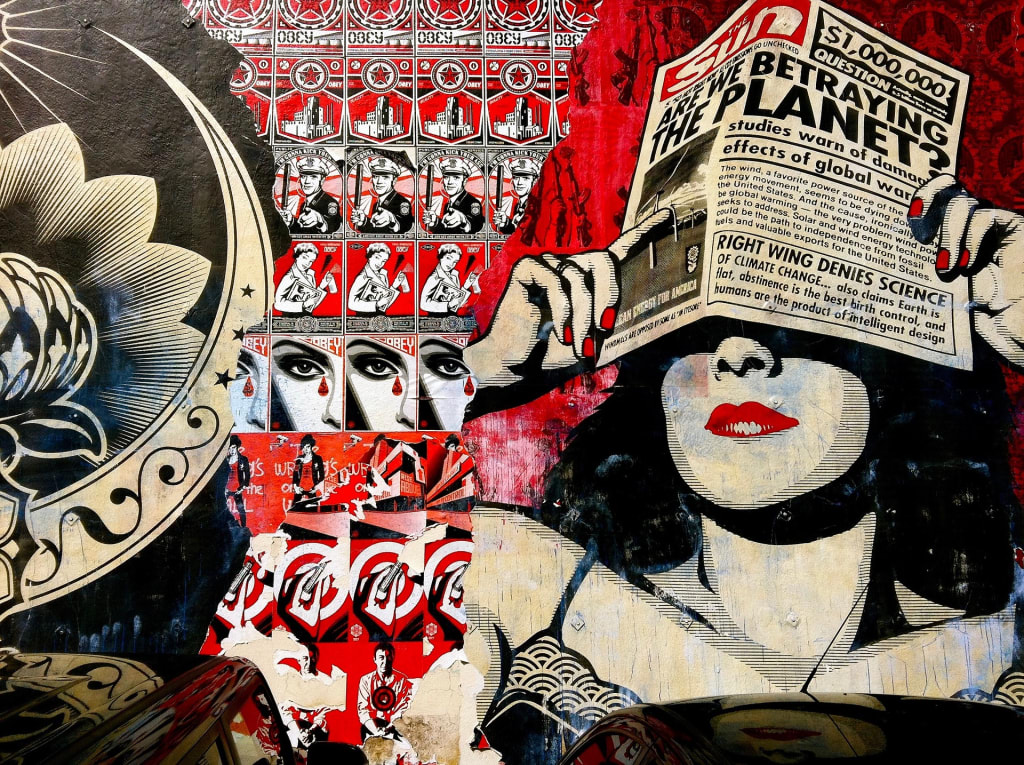Propaganda: Better With or Without It?
Causes and Effects of Propaganda in Social Media

“Propaganda is indifferent to truth and truthfulness, knowledge and understanding; it is a form of strategic communication that uses any means to accomplish its ends.” (Walter Cunningham). Humanity, always going forward to the future, living in the world of present and looking in the old window of history, can track the evolution of propaganda and its transformation into various types of mass media for many different purposes. This form of information has emotional impact that attempts to shape perceptions, influencing the attitude of a population and manipulating cognitions always toward some political, ideological, or commercial causes.
Nowadays, as well as in the past, propaganda is one of the key links in the political system. The situation of countries, where corruption is rampant and officials act for their own enrichment, generates an increase in taxes and decline of wages. So, the population starts to resent and ask a lot of questions about the reasons of their welfare deterioration, and after that there is a threat to the existence of current government, and then they begin to use propaganda to cover their illegal actions and the truth that threatens their well-being. A special situation can be observed now in modern Russia where, despite the rapidly deteriorating political and economic situation, state media continues to convince the population of the opposite. On each of the major television channels like “Russia 1” or First Channel there are several talk shows such as Duel, Evening with Vladimir Solovyov, 60 Minutes, and many others, where social and political topics are discussed by invited guests. It is enough to look at the lists of guests of these and other political shows to notice: from the transfer to the transfer, the same people are wandering. And some of them are experts on almost all issues. The structure of the show, themes, and receptions is also repeated. The government found the most influential points in propaganda system which is successful among the majority of the population and actively uses it.
Also, censorship is one of the greatest tools that facilitates propaganda in government's hands. When a state wants to impose the fake reality which is favorable for them, the obvious necessity is the riddance from the sources that narrate a truth. Domestic politicians are afraid and do not admit the truth, not letting people speak out about what bothers them—namely, talking against the authorities. In Russia, people in power block public opinion which, most often, contradicts the constitution and all democratic values. Moreover, censorship is a brake of the exposition of humans thought. An English poet, polemicist, a man of letters and a civil servant for the Commonwealth of England under Oliver Cromwell, John Milton (1608-1674) also was known as the author of the first text that speaks of the need to abolish censure. This treatise, which was addressed to the parliament, is called Areopagitica. It was a kind of message that said the preliminary censorship interferes with the realization of God's design because if a person has an idea in his soul, he have to have the ability to express it, disagreeing with anyone. There may be some plan for God to get through this person some idea into the world, and people prevent it from realizing. Thus, the government breaks the principles of human beings, making people believe them and not say what they think, or don't think at all. Authorities tighten the laws which affects the feelings and consciousness of citizens about lack of prospects, and things will get worse. Further, there are social problems such as political indifference, which people used to live through with their heads down, and when it comes to election of political awareness most of them vote for Putin; reduction of population due to many people who emigrate to other countries; and, also, one of the consequences of emotionally manipulative media weapon is general ignorance of the life abroad. Approximately 75% of people don't have an international passport as result of thinking that they are living very well compared to TV-propaganda about life in other countries. Today, Russia almost has the state information monopoly that is controlling mass media distribution of official truth, monopoly information, meaning that every printed word and the electronic media movement are controlled by the central authority.
However, this form of purposeful persuasion implies not only misrepresentation of verity, but also can be used to maintain the morale of the population during the Second World War. For instance, the British government had to balance between whole arsenal of psychological methods and creating an impression of maximum truthfulness. According to an academic historian specialising in the study of twentieth-century propaganda, David Welch, in 1941, film director Charles Ridley performed for the Information Ministry a witty editing of documentary newsreels of marching Nazis in Nuremberg, putting on it a popular dance motif from the musical Me and My Girl. The resulting plot was shown in a newsreel called Germany Is calling. Rapid rewind helped to ease the sense of threat emanating from SS ranks under the leadership of the ridiculous kind of Hitler, and make comic characters in the best traditions of silent cinema. The lowering of the frightening enemy to the level of accessibility and ridiculousness, as in this cartoon of Hitler and his troops, from a psychological point of view is a means of gaining power over him for actively watching at that time the British population. Moreover, in some of its campaigns, the Ministry of Information could play on existing stereotypes, but in some cases a different approach was required. Joseph Stalin, who was previously portrayed in British propaganda as a deceitful and treacherous dictator, suddenly changed into a good-natured person. Praising the courage and fighting spirit of the Russian people and depicting Stalin as a fighter for the freedom of their homeland, the British propagandists managed to hush up all the questions connected with the sharp change in attitude towards the Soviet Union in comparison with the pre-war period.
Propaganda can effectively play with people's opinions, their points of view, spirit, and strength of mind in both in negative and positive ways. Causes and consequences of propaganda depend on the intentions and goals of a particular group of people or one person that have the greatest responsibility to their people.
Here I'm talking about main causes of propaganda, its development, and different effects on society.
About the Creator
Gregory Swetly
All-round writer who interested in the world and consider it in different aspects to share with people.






Comments
There are no comments for this story
Be the first to respond and start the conversation.